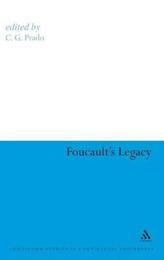
|
Foucault's Legacy
Hardback
Main Details
| Title |
Foucault's Legacy
|
| Authors and Contributors |
Edited by Professor C.G. Prado
|
| Series | Continuum Studies in Continental Philosophy |
|---|
| Physical Properties |
| Format:Hardback | | Pages:180 | | Dimensions(mm): Height 234,Width 156 |
|
| Category/Genre | Western philosophy from c 1900 to now |
|---|
| ISBN/Barcode |
9781847065957
|
| Classifications | Dewey:194 |
|---|
| Audience | | Undergraduate | | Postgraduate, Research & Scholarly | |
|---|
|
Publishing Details |
| Publisher |
Bloomsbury Publishing PLC
|
| Imprint |
Continuum International Publishing Group Ltd.
|
| Publication Date |
1 March 2009 |
| Publication Country |
United Kingdom
|
Description
Foucault's Legacy brings together the work of eight Foucault specialists in an important collection of essays marking the 25th anniversary of Foucault's death. Focusing on the importance of Foucault's most central ideas for present-day philosophy, the book shows how his influence goes beyond his own canonical tradition and linguistic milieu. The essays in this book explore key areas of Foucault's thought by comparing aspects of his work with the thought of a number of major philosophers, including Nietzsche, Heidegger, Rorty, Hegel, Searle, Vattimo and Williams. Crucially the book also considers the applicability of his central ideas to broader issues such as totalitarianism, religion, and self-sacrifice. Presenting a fresh and exciting vision of Foucault as a philosopher of enduring influence, the book shows how important Foucault remains to philosophy today.
Author Biography
C.G. Prado is Professor Emeritus of Philosophy at Queen's University, Canada. His previous publications include Starting with Foucault (Westview, 2000), A House Divided: Comparing Analytic and Continental Philosophy (Humanity, 2003), Searle and Foucault on Truth (Cambridge, 2006) and Choosing to Die: Elective Death and Multiculturalism (Cambridge, 2008).
Reviews"Foucault felt the epistemic sands shifting under his feet in the mid 1960s. He both registered that shift and contributed to it. In the quarter-century since his death, it is fitting that we consider the extent of the "Foucault effect" on the many areas encompassed by his "ethnology" of his own culture. The authoritative contributors to Foucault's Legacy meet this challenge with insight into his originality and a keen , though not uncritical, sense of his continued relevance to 21-century thought. An extremely valuable collection" - Thomas R. Flynn, Emory University, USA
|